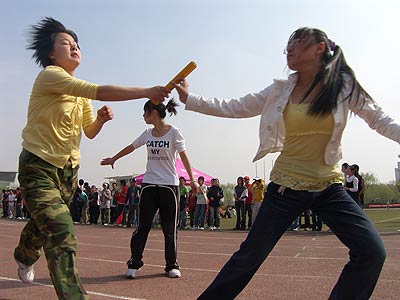
It's a scenic walk on an elegant slope from the main gate of Central China Normal University to the school of Chinese literature. But Cheng Jiamin, 20, a junior, finds it so exhausting that she has to think twice before visiting the shops near the gate.
從華中師范大學的正門到該校文學院是一段風景優(yōu)美的斜坡,但就是這么一段路程,令20歲的大三學生陳佳明(音譯)感到筋疲力盡,所以她要去校門口的商店買東西之前都不得不考慮再三。
A recent report says college students' physical fitness is lamentable. Experts warn a growing trend of staying in dorms, unhealthy diets and lack of exercise.
最新一項報告顯示,大學生身體素質(zhì)令人擔憂。專家提醒,宅在宿舍,不良飲食和缺乏運動的學生人數(shù)呈日益增長趨勢。
The Chinese Health Education Center recently issued a report showing that more than 50 percent of college students lack enough exercise and 13 percent of them are obese.
根據(jù)中國健康教育中心最新公布的一份報告顯示,超過半數(shù)的大學生缺乏充分的體育鍛煉,其中13%的人過度肥胖。
"We have so many other options to keep ourselves busy, plus it's really cold to work out outdoors," said Cheng.
“我們有好多其他的事情要忙,而且在戶外鍛煉太冷了。”陳佳明說。
Ma Guansheng is director of the Institute for Nutrition and Food Safety under the Chinese Center for Disease Control and Prevention.
馬冠生是中國疾病預防控制中心下屬的營養(yǎng)與食品安全所所長。
Ma reckons that students' physical condition is degenerating, with regard to stamina, agility and power.
馬冠生認為學生的身體素質(zhì)正在不斷下降,主要體現(xiàn)在耐力,機敏性和力量。
"Females students in particular are out of condition and underweight. More than 35 percent of women on campus are unhealthily slim," Ma told Xinhua News Agency last week.
“特別是女生,普遍健康狀況不佳,體重不達標。大學校園中,超過35%的女生過瘦。”馬冠生在上星期接受新華社采訪時表示。
"Dieting is harming their health and tends to impact their future well-being."
“節(jié)食減肥正在傷害她們的身體健康,并可能為她們今后的健康狀況埋下隱患。”
However, Cheng still feels guilty after eating a full meal and tries to avoid being too active so that "I don't look sweaty and messy".
而陳佳明仍就會在飽餐一頓之后感到內(nèi)疚,并避免太過活躍,因為不想自己“看起來汗流浹背,不夠整潔。”
Not only female students shun sports. Some young men are reluctant to go to the playing fields.
對運動說不的,不僅僅是大學女生,有些男生也不愿到運動場去。
Zhang Yichang, 21, a junior at Guangzhou University, stays in his dorm almost all day. Skipping meals and staying up late is his regular lifestyle.
21歲的張易辰(音譯)是廣州大學一名大三學生,他幾乎整天都宅在寢室里。飲食不規(guī)律和熬夜幾乎成了他的日常生活方式。
But he is not bored: video games, online chatting, micro blogging and updating social networking sites takes up most of his time.
但他不會無聊:電子游戲、網(wǎng)上聊天、微博、更新社交網(wǎng)站(個人主頁),這些占用了他大部分時間。
Zhang researches and writes up assignments using his laptop.
張易辰用筆記本電腦來做研究、寫作業(yè)。
"I am not a geek," he said.
“我并不是一個書呆子。”他說。
"Many students in my dorm building are like me, some even have their meals delivered to their doors," said Zhang.
“在我們宿舍樓里,很多同學都和我一樣,有的甚至還叫外賣,直接送上門。”
Lack of exercise is likely to cause obesity and overweight which then lead to various chronic diseases, according to Kong Lingzhi, deputy director of the disease prevention and control bureau of the Ministry of Health.
衛(wèi)生部疾病預防控制局副局長孔靈芝表示,缺乏鍛煉很可能導致肥胖和超重,進而引發(fā)多種慢性疾病。
She says that there are over 300 million Chinese suffering from chronic disease and more students are likely to join them if they choose to lead an inactive campus life.
她表示,中國人患有慢性疾病的人數(shù)現(xiàn)已超過3億人,如果更多的大學生都去選擇過這樣一種懶散的生活的話,那這一數(shù)量還會上升。
"Students' inactivity will become a problem when those young people enter the workforce in the near future," said Kong.
“不久的將來,當這些年輕學生步入職場時,消極懶散將會成為一個難題。”孔靈芝說。












